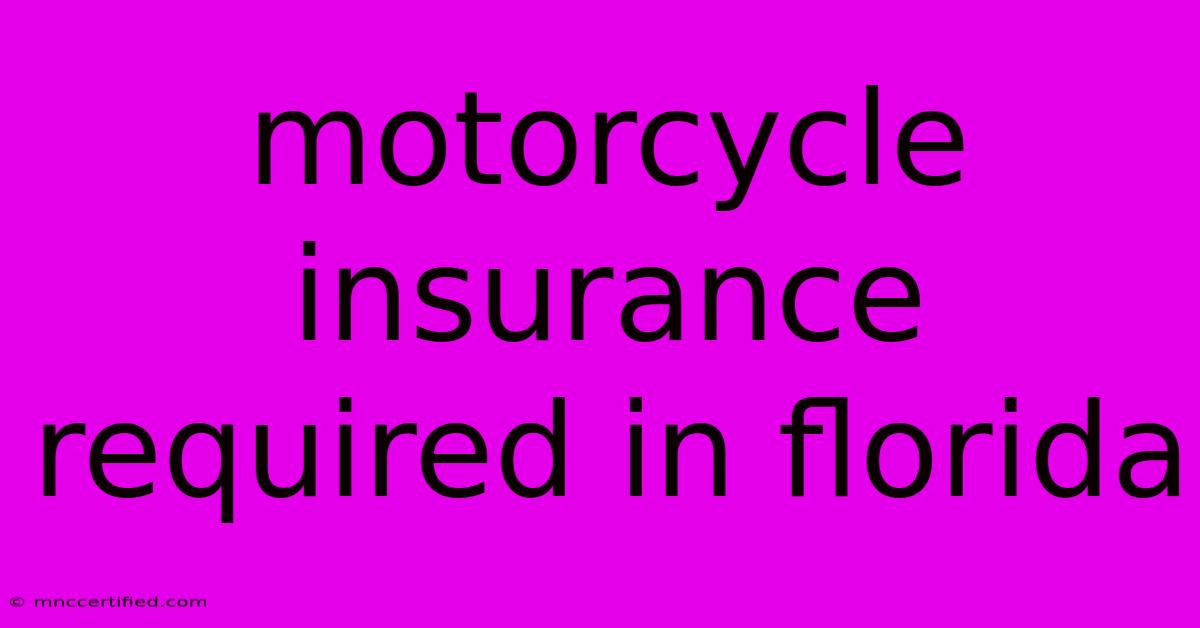Motorcycle Insurance Required In Florida

Table of Contents
Is Motorcycle Insurance Required in Florida? A Comprehensive Guide
If you're a motorcycle enthusiast in Florida, you're probably excited to hit the open road. But before you rev your engine, you need to understand the Florida motorcycle insurance laws.
In short, yes, motorcycle insurance is required in Florida. However, the specific requirements can be complex and vary depending on your individual circumstances.
This guide will walk you through everything you need to know about motorcycle insurance in Florida:
Florida's Motorcycle Insurance Requirements
Florida law mandates that all motorcycle owners have the following types of insurance coverage:
- Property Damage Liability: This covers damage you cause to another person's property, such as their vehicle or home, in an accident.
- Bodily Injury Liability: This protects you financially if you injure someone in an accident.
The minimum required limits for both types of liability coverage are:
- $10,000 for property damage
- $10,000 per person for bodily injury
- $20,000 per accident for bodily injury
These minimum limits are designed to provide basic protection, but they may not be enough to cover all the costs associated with a serious accident.
Understanding Additional Motorcycle Insurance Options
While the required minimums are essential, you may want to consider additional coverage options for better peace of mind:
- Collision Coverage: This covers damages to your motorcycle in an accident, regardless of who is at fault.
- Comprehensive Coverage: This protects you against damage to your motorcycle caused by events other than accidents, such as theft, fire, or vandalism.
- Uninsured Motorist Coverage: This covers you if you are hit by an uninsured or underinsured driver.
- Medical Payments Coverage: This pays for medical expenses for you and your passengers, regardless of fault.
Factors Affecting Your Motorcycle Insurance Costs
Several factors can impact your motorcycle insurance premiums in Florida:
- Your Age: Younger riders generally pay higher premiums due to higher risk.
- Your Riding Experience: Experienced riders with a clean driving record may qualify for lower premiums.
- Your Motorcycle Type: High-performance or expensive motorcycles tend to be more costly to insure.
- Your Location: Some areas have higher rates of accidents, which can influence your premiums.
- Your Credit Score: Your credit history can play a role in determining your rates in some cases.
How to Find the Right Motorcycle Insurance Policy
Getting quotes from multiple insurance companies is crucial to finding the best rates. Here are some tips for finding the right motorcycle insurance policy in Florida:
- Compare quotes online: Many online platforms allow you to compare quotes from different insurance companies simultaneously.
- Talk to your existing car insurance provider: Your current insurer may offer discounts for bundling motorcycle and auto insurance.
- Consider specialized motorcycle insurance companies: These companies often offer more tailored coverage options for riders.
- Ask about discounts: Many insurers offer discounts for safe driving records, safety courses, and anti-theft devices.
Navigating Florida's Motorcycle Laws
Remember, riding a motorcycle in Florida requires not only insurance but also adherence to specific laws and regulations.
Here are some important points to keep in mind:
- Helmet laws: Florida law requires all motorcycle riders under 21 and all passengers to wear helmets. Riders over 21 are not legally required to wear helmets, but it's strongly recommended for safety reasons.
- Lane splitting: Florida law prohibits motorcycles from riding between lanes of traffic.
- Motorcycle registration: You must register your motorcycle with the state of Florida.
- Motorcycle inspection: Motorcycles in Florida do not require regular inspections.
By understanding Florida's motorcycle insurance requirements and additional coverage options, you can choose the best policy for your needs and ride confidently on Florida's roads. Remember, safety should always be your top priority, and proper insurance can help protect you financially in case of an accident.

Thank you for visiting our website wich cover about Motorcycle Insurance Required In Florida. We hope the information provided has been useful to you. Feel free to contact us if you have any questions or need further assistance. See you next time and dont miss to bookmark.
Featured Posts
-
Free Nba Stream Warriors Vs Celtics Today
Nov 07, 2024
-
Trump Inauguration Day Date And Details
Nov 07, 2024
-
Inauguration Day 2021 Trump Takes Office
Nov 07, 2024
-
Incumbent Democrats Sweep Washington Down Ballot
Nov 07, 2024
-
Gary Barlow Sons Height Towering Over Take That
Nov 07, 2024